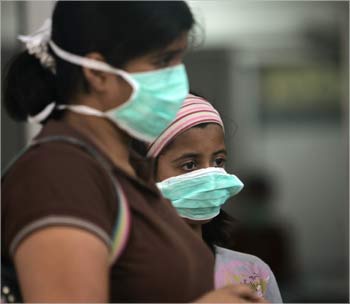 Fast food joints, hotels and restaurants across Bangalore are seeing an upswing in home delivery orders as swine flu wary consumers avoid crowded eating joints.
Fast food joints, hotels and restaurants across Bangalore are seeing an upswing in home delivery orders as swine flu wary consumers avoid crowded eating joints.
The parcel counter at various restaurants and hotels are busy thanks to the increase in orders for food to be delivered at home, according to industry sources.
"We have seen an uptake in home deliveries by 10 per cent", says Ritesh Dwivedy, co-founder of Hungryzone.com, a popular food website, that enables placing home delivery orders and booking tables at various eating joints among other services.
"Though the high-end segment and hotels have not seen a dip in booking tables, it is the medium range hotels and restaurants consumers that have begun opting for food from their popular restaurants to be delivered at home", he said.
A marketing official of a popular food chain said, "We have seen hometake aways increase in the last two weeks".
"In our apartment, many of us have decided to skip eating outside and now have begun ordering food to be delivered at home. While eating out at crowded places, the chances of catching the virus is more, hence we have opted for this safe option," says a resident of an upmarket area.
According to Ritesh, bulk of their business comes from home deliveries and now it has further gone up due to the flu scare. But 30 per cent of their business which comes from booking orders at high-end hotels had not been impacted, he said.
"Bookings for tables at mid-range hotels and restaurants have been slightly impacted", said Ritesh, but business here had been compensated by the rise in home deliveries.
The impact has been more pronounced in residential areas rather than the commercial hubs like Brigade Road, says Ritesh, whose main client profile include those in the age group of 23-30 and working in the IT-ITES or banking sectors.
Another trend is that increasing number of parents are placing orders for food to be delivered to their wards residing in hostels, says Ajay, co-founder of webdhaba.com, another popular food website.
Parents were hoping that the home food delivery would desist the youngsters from frequenting popular eating joints and thereby minimise chances of catching the flu.
Following the flu scare, 'there has been an increased focus on home deliveries even among restaurant owners', says Ajay. 'You cannot wish the flu away' and with apprehensions that it may last a little longer hotel, restaurant and eatery owners are gearing to upscale their home delivery business model in the coming months.
The usual office crowd sauntering in for a mid-day break into a nearby restaurant to sip some hot tea and exchange office gossip and others seeking for a quiet corner to ease job pressure, have seen a change. Officegoers ordering their meal to be delivered at their workplace has seen an uptake.
"We have skipped going out for lunch. We now rather prefer to order the same food at office. Eating out means venturing into crowded places and sitting at a joint where people from all backgrounds walk in, irrespective of their health status", said a woman working in a commercial hub.
In a popular fast food chain located in a mall in Sarjapur, frequented by the IT crowd, the outlet had seen a dip of an estimated 30 per cent in customers, while another outlet in the business hub Cunningham Road had witnessed a 15-20 per cent drop in the number of customers.
The fast food's outlet in Kormangala had implemented strict hygiene standards. "We have started recording body temperature of our staff periodically to ensure no one is running fever," said an employee. "We are wearing gloves constantly, be it handling food or receiving cash from customers", said another.
According to Amrita Pai, senior manager, Corporate Communication, at McDonald, very strict hygiene standards have been put in place. "The temperature of the staff coming in is monitored every four hours. Anybody showing symptoms of fever, cold, cough is not allowed to work."
Use of alcohol-based handwash for the staff had been put in place apart from other hygiene standards, she said.
Some of the restaurants are working out plans to check out persons who come in and display symptoms of cough and cold while others are planning to come out with leaflets about precautionary measures to be handed over to customers at the entry.





